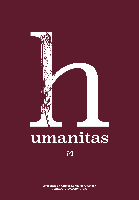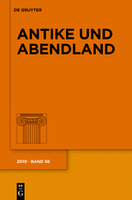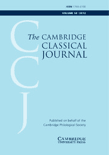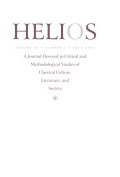
International Journal of the Classical Tradition
Scope & Guideline
Advancing Knowledge Through the Lens of Classical Traditions
Introduction
Aims and Scopes
- Interdisciplinary Approaches to Classics:
The journal promotes research that integrates various disciplines, including literature, history, philosophy, and art history, to analyze classical antiquity and its modern interpretations. - Cultural Reception and Influence:
A core focus is on how classical texts, figures, and themes have been received and reinterpreted in various cultural contexts, revealing the dynamic interplay between the ancient and modern worlds. - Exploration of Neo-Latin Literature:
The journal frequently publishes works that examine Neo-Latin literature, emphasizing its significance in the Renaissance and later periods as a continuation of classical traditions. - Mythological Adaptations and Modern Interpretations:
Research that investigates the adaptation of classical myths in contemporary literature and media, illustrating the relevance of these ancient narratives in modern storytelling. - Global Perspectives on Classical Traditions:
The journal encourages submissions that explore classical influences beyond the Western canon, including studies on the reception of classical texts in non-Western cultures. - Historical Contextualization of Classical Texts:
An emphasis on the historical contexts of classical texts, including their production, transmission, and impact over time, is a significant aspect of the journal's scope.
Trending and Emerging
- Ecocritical Approaches to Classical Texts:
An increasing number of publications are focusing on the intersection of classical mythology and ecological discourse, emphasizing how ancient texts can inform contemporary environmental issues. - Globalization and Classical Reception:
Research examining the global dissemination and reinterpretation of classical texts is on the rise, highlighting how classical traditions are reshaped in diverse cultural contexts. - Classics and Identity Politics:
There is a growing interest in exploring how classical themes intersect with issues of identity, including race, gender, and sexuality, reflecting broader societal conversations. - Intertextuality and Adaptation Studies:
Studies that analyze intertextual relationships between classical texts and modern works, including literature, film, and video games, are emerging as a significant area of focus. - Digital Humanities and Classical Studies:
The integration of digital humanities methodologies into classical studies is gaining traction, with scholars utilizing digital tools for analysis, visualization, and dissemination of classical research.
Declining or Waning
- Traditional Philological Studies:
There appears to be a waning focus on traditional philological approaches, which emphasize textual criticism and the close reading of classical texts, as scholars increasingly embrace interdisciplinary and contextual methodologies. - Classical Antiquity as a Static Reference:
Research that treats classical antiquity as a static or unchanging reference point has declined, giving way to more dynamic discussions that consider the fluidity of classical influences in contemporary contexts. - Narrow Nationalistic Perspectives:
Papers that focus solely on nationalistic interpretations of classical texts or themes are less frequent, as the field moves towards more global and interconnected analyses. - Limited Focus on Ancient Languages:
There has been a decrease in studies that primarily engage with ancient languages in isolation, as the journal's scope has expanded to include broader cultural and interdisciplinary perspectives.
Similar Journals

Antichthon
Illuminating the Rich Tapestry of AntiquityAntichthon, published by Cambridge University Press, stands as a vital platform within the field of Classics. Established in 1986, the journal has evolved to encompass scholarly contributions that explore various dimensions of classical studies, including literature, history, and cultural studies. With its rich publication history extending from 2011 to 2023, Antichthon boasts a commendable Q2 ranking in the latest 2023 Category Quartiles for Classics, reflecting its significant impact in the academic community. Although the journal does not offer an Open Access option, it continues to engage researchers and academics with its curated selection of articles, reviews, and critical insights. Located at the Edinburgh Building, Shaftesbury Rd, Cambridge, England, this journal remains an essential resource for both established scholars and students aiming to deepen their understanding of classical antiquity and its enduring relevance.

Boletim de Estudos Classicos
Cultivating Emerging Voices in Classical EducationBoletim de Estudos Clássicos is a distinguished scholarly journal dedicated to the field of Classics and Education, published by COIMBRA UNIV PRESS. Since its transition to an open-access format in 2013, the journal has aimed to broaden the accessibility of high-quality research and critical discussions within these disciplines. Despite its current categorizations in the Q4 quartile for both Classics and Education, the Boletim has a unique opportunity to serve as a platform for emerging voices and innovative research, fostering growth in an otherwise underrepresented area. Based in Portugal, the journal invites contributions that encompass a wide range of topics, from ancient texts and historical analysis to educational methodologies and pedagogy. With an ISSN of 0872-2110 and an E-ISSN of 2183-7260, the journal actively seeks to attract researchers, professionals, and students dedicated to the exploration of classical studies. The journal's address is RUA DA ILHA, NO 1, COIMBRA 3000-214, PORTUGAL, where its contributors and editorial board strive to inspire a deeper understanding of classical heritage and its relevance to contemporary education.

GYMNASIUM
Cultivating a Deeper Understanding of Ancient and Modern ScholarshipGYMNASIUM, published by Universitätsverlag C Winter Heidelberg GmbH, is an academic journal dedicated to the fields of Classics and Education. Since its inception in 1970, the journal has served as a platform for scholarly discourse, focusing on the intersection of classical studies and educational methodologies. Despite its discontinuation from Scopus coverage post-2021, GYMNASIUM remains an important resource for researchers, professionals, and students, fostering a deeper understanding of ancient texts and their relevance in contemporary educational frameworks. Current rankings place the journal in the Q4 quartile in both Classics and Education categories, reflecting its niche yet significant contribution to these fields. Researchers can access the journal's past issues through various academic libraries in Germany, enhancing interdisciplinary study and promoting scholarship across broader educational horizons.

Humanitas-Portugal
Unlocking the Rich Tapestry of Human ThoughtHumanitas-Portugal is a distinguished open access journal published by IMPRENSA UNIV COIMBRA that has been fostering scholarly dialogue since its inception in 1947. With an ISSN of 0871-1569 and E-ISSN 2183-1718, the journal serves as a platform for rigorous academic work in the fields of Archeology, Classics, History, Philosophy, and Religious Studies. Although positioned in the Q4 quartile by Scopus rankings, its commitment to accessibility and knowledge dissemination in Portugal highlights its significance to the academic community. Researchers and students can access articles openly, encouraging a broader engagement with various disciplines. With its convergence of studies from 2018 to 2024, Humanitas-Portugal continues to contribute to the understanding of human culture and thought, making it an essential resource for anyone invested in the humanities.

ANTIKE UND ABENDLAND
Illuminating the Legacy of Classical Studies for Future Generations.ANTIKE UND ABENDLAND, published by Walter de Gruyter GmbH, is a vital interdisciplinary journal based in Germany that delves into the rich tapestry of classical studies, history, literature, and philosophy. With an impressive history dating back to its inception in the mid-20th century, this journal aims to foster scholarly discourse and promote cutting-edge research that bridges ancient and modern thought. Although it currently does not offer open-access options, its focus on high-quality scholarly contributions has resulted in its classification within the Q4 quartile across various disciplines, including Classics, History, Literature, and Philosophy. Researchers, academics, and students alike will find in ANTIKE UND ABENDLAND a valuable resource that enriches understanding of historical and literary contexts, offering fresh insights and interpretations essential for a nuanced engagement with the classics and their influence on contemporary society.

Myrtia
Exploring biodiversity to enrich our planet.Myrtia is a distinguished academic journal published by Universidad de Murcia, focusing primarily on the fields of environmental sciences and biodiversity. With the ISSN 0213-7674 and E-ISSN 1989-4619, it serves as a vital platform for researchers and professionals to disseminate innovative findings and foster discussions that advance our understanding of ecological dynamics and sustainable practices. The journal reflects a commitment to promoting open access knowledge, aiming to increase the visibility and impact of research in these critical areas. As researchers seek to address pressing environmental challenges, Myrtia remains an essential resource for high-quality, peer-reviewed articles that contribute to a holistic understanding of our ecosystem. Its association with a reputable institution and dedication to scholarly excellence makes it a key player in the academic landscape, inviting contributions that shape future environmental research and policy.

Cambridge Classical Journal
Fostering Dialogue Across the Classical SpectrumThe Cambridge Classical Journal, published by Cambridge University Press, is a prestigious academic journal that has been a cornerstone of classical scholarship since its inception in 1884. With a focus on advancing knowledge in the fields of Classics, Linguistics, and Literature and Literary Theory, the journal operates with an annual publication cycle, showcasing cutting-edge research that contributes significantly to these disciplines. With a commendable impact factor and ranking in the top quartile (Q1) for Classics and Q2 for Literature and Literary Theory as of 2023, it remains an essential resource for scholars, students, and professionals alike. The journal's commitment to excellence is evident in its rigorous peer-review process and its role in fostering scholarly dialogue on classical texts and their linguistic and cultural implications. While the Cambridge Classical Journal is not an open-access publication, it is invaluable for anyone seeking to deepen their understanding of the classical world and its enduring influence on contemporary thought.

MNEMOSYNE
Advancing the frontiers of humanities scholarship.MNEMOSYNE is a prestigious academic journal published by BRILL, specializing in the fields of Archeology, Classics, History, Linguistics and Language, and Literature and Literary Theory. With a remarkable history dating back to its inception in 1948, this journal continues to be a crucial resource for scholars and researchers, spanning its publication years that extend to 2024. The journal boasts high rankings in multiple categories according to Scopus, including Q1 status in Classics and History, reflecting its impact and relevance in the academic community. Although it is not an Open Access journal, its selection of peer-reviewed articles ensures rigorous scholarship that contributes to ongoing discussions and discoveries in the humanities. By providing a platform for innovative research and critical discourse, MNEMOSYNE plays an integral role in advancing the understanding of cultural and historical contexts, making it an essential read for both seasoned academics and emerging scholars alike.

HELIOS
Fostering Academic Excellence Since 1984.HELIOS is a distinguished academic journal published by TEXAS TECH UNIVERSITY PRESS, focusing on the fields of Classics, Cultural Studies, Linguistics and Language, and Literature and Literary Theory. Since its inception in 1984, the journal has served as a platform for scholarly discourse, publishing innovative research that intersects various humanistic disciplines. With a Q3 ranking in Classics and Literature and Literary Theory, as well as a Q4 ranking in Cultural Studies and Linguistics and Language, HELIOS demonstrates its commitment to advancing academic inquiry and knowledge dissemination. Although it is not an open-access publication, HELIOS remains a vital resource for researchers, professionals, and students seeking to explore and contribute to the evolving landscape of the humanities. The journal is based in the United States, with its administrative office located at 2903 Fourth Street, Suite 201, Box 41037, Lubbock, TX 79409-1037, making it an integral part of the scholarly community.

Cuadernos de Filologia Clasica-Estudios Latinos
Unveiling the Rich Legacy of Latin StudiesCuadernos de Filologia Clasica-Estudios Latinos is a distinguished academic journal dedicated to the field of classical philology, with a particular emphasis on Latin studies. Published by UNIV COMPLUTENSE MADRID, SERVICIO PUBLICACIONES, this journal serves as a vital platform for scholars, educators, and students interested in the rich legacy of Latin literature and its linguistic intricacies. The journal, identifiable by its ISSN 1131-9062 and E-ISSN 1988-2343, aims to foster scholarly dialogue through the publication of innovative research articles, critical essays, and book reviews that advance knowledge within this specialized discipline. Although it operates under a non-open access model, its contributions are invaluable, enriching the academic community's understanding of classical texts and their contemporary significance. Through its rigorous scholarship and commitment to excellence, Cuadernos de Filologia Clasica-Estudios Latinos positions itself as an essential resource for anyone invested in the study of classical languages and literatures.